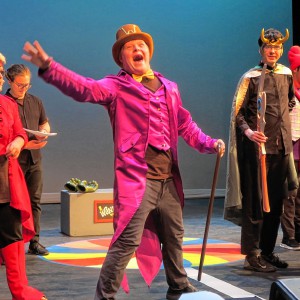
The author’s son Aidan has sung at past performances.
I first wrote about my son Aidan on these pages when he was 18 months old – almost 26 years ago. He was diagnosed with Down Syndrome, and I wrote about the fears, joys, and unknowns we faced. I remember feeling so anxious about what he would face in middle school and high school: would he be bullied, would he be accepted, would he have real friends?
There was no need to worry. Aidan went out into the world with a big spirit and an even bigger smile and refused to let anyone push him aside. He made good friends, joined student council, performed in plays and even went to prom.
And since graduating, he’s been embraced by the community: He frequents both libraries, volunteers at his retirement community several hours a week, works out at the gym and is a regular at Cooper’s Corner and the Big Y, both of which are like Cheers to him.
But everyone who knows Aidan knows his one true love is performing. He loves to dance and act, and most of all, he loves to sing. There’s no one within a two-mile radius of the Florence Center who hasn’t heard Aidan sing while walking down the street. His voice won’t get you a spot on American Idol, but the pure joy of it is undeniable. People stop us all the time and say things like, “Aidan’s voice is amazing today.”
He sang in his middle school and high school choirs and was a regular with the Joyful Chorus, an inclusive chorus for all children. He has shared the stage with musicians such as Dan Zanes, Sara Lee Guthrie, and The Young@Heart Chorus. He has participated in countless musical theater productions.
So when Aidan saw a big color ad in the newspaper this spring for a “no audition” community choir that would devote summer sessions to Queen songs, he was ecstatic. He’s a guy who knows Queen songs word for word, and they could be the soundtrack to his life’s anthems: “We Are the Champions,” “Don’t Stop Me Now,” “We Will Rock You.”
After the first rehearsal, the director called me and said she was concerned that Aidan’s voice didn’t “fit in” with the group and that he had been yelling during rehearsals. I realized this was a behavior that Aidan exhibited when he was anxious or in a new situation. I explained this to the director and said I would coach Aidan through the issue.
Before the second rehearsal, Aidan reported back to the director, told him he understood the issues and would work hard to get his voice to blend well. After the second rehearsal, Aidan cheerfully said he had had a great time. Apparently, that wasn’t enough.
The next day, the director called to tell him that Aidan had been rejected – he couldn’t join the choir because he couldn’t “sing in tune.” This “no audition” community choir was open to anyone.
I asked if we could hire someone to sit next to him and give him instructions on how to tone his voice, but the director still said no. His decision was final.
I admitted that I was shocked and told the director that he would have to tell Aidan himself because I had no idea how to tell him without shocking him. After the phone call with the director, Aidan said, “I don’t belong here.”
And now, 28 years later, here we are, facing the wall we all expected to hit all this time, and it is just as brutal and incomprehensible as I thought it would be.
Of course, Aidan has been rejected before — he’s auditioned for local commercials, roles in high school plays, and choir solos — and there are plenty of parts he hasn’t gotten yet, but that’s OK.
But the choir’s newspaper ads said, “No Auditions.” They advertised, “Anyone Can Sing With Us!” Apparently, what they really meant was, “Anyone Can Sing With Us (Except You).”
In one month, Aidan faces more challenges than most of us could ever handle in a lifetime. Every day, he climbs Everest. There are many people who cheer him on, some who even lend a hand, and sadly, some who try to pull him down.
In a community that claims to value diversity and inclusion, I assumed most people would be helpful and supportive, but in recent years we’ve seen a neighborhood oppose sidewalk improvements, special education students labeled as “second-class learners,” and now a local choir rejecting a musically inclined young person because of his or her disability.
It’s a stark reminder that despite the progress we’ve made, huge barriers to true inclusion remain — and those barriers lie with people who refuse to see possibilities in the face of obstacles.
Vale Dwight lives in Florence.

